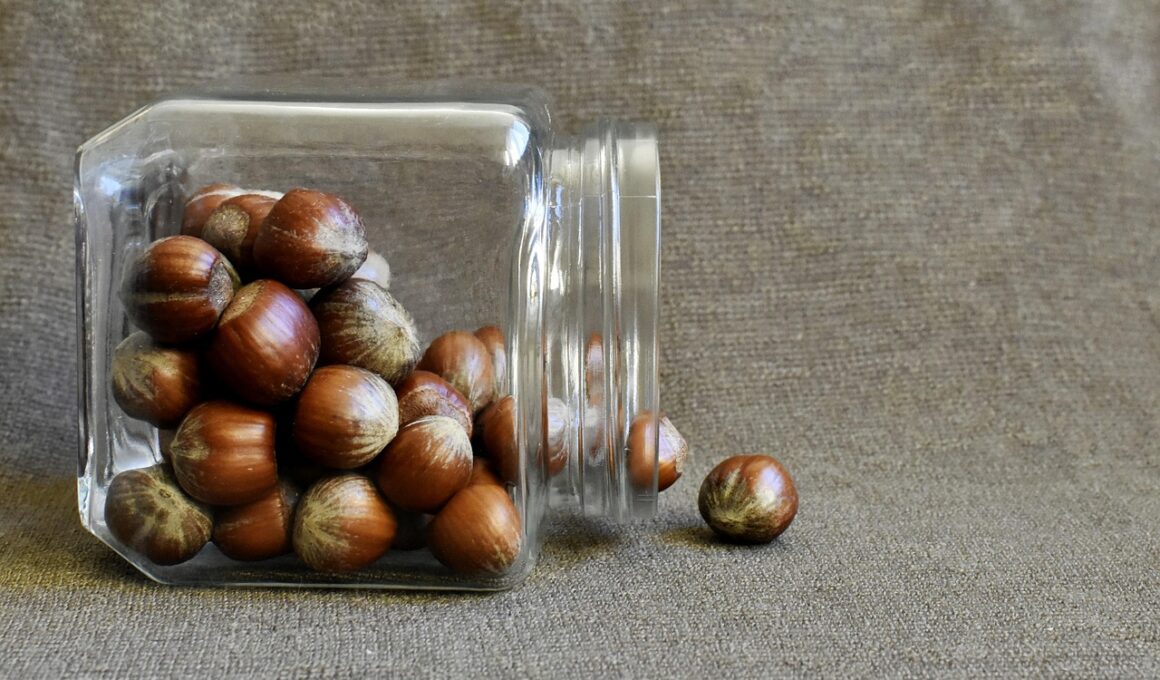The Impact of Pre-Workout Fats on Weight Loss Efforts
Nutrition plays a crucial role in enhancing your fitness goals, especially when it comes to weight loss. Among the various components of your diet, fats often receive mixed reactions. The truth is that incorporating healthy fats into your pre-workout meal can be beneficial. Healthy fats, such as those found in avocados, nuts, and seeds, provide long-lasting energy during workouts. Furthermore, they assist in the absorption of fat-soluble vitamins, which can improve overall health. It’s also essential to remember that not all fats are created equal. Actually, choosing the right types of fats can help you feel satisfied while maintaining a caloric deficit necessary for weight loss. Studies show that unsaturated fats may improve metabolic rates, allowing you to burn calories more efficiently. The key is moderation and timing. Consuming a modest portion of healthy fats about thirty minutes to an hour before exercising can optimize performance without weighing you down. This approach may help support your weight loss efforts while also providing crucial nutritional elements for your body.
Understanding the Role of Fats in Pre-Workout Nutrition
Fats are essential macronutrients that play numerous roles in bodily functions; they can also impact workout efficacy. When you engage in physical activities, your body taps into stored fat as an energy source. Therefore, including healthy fats in your pre-workout meal can maximize energy availability. Some sources of healthy fats include olive oil, fish, and chia seeds, providing omega-3 fatty acids beneficial for inflammation. Research suggests that fats help regulate hormones, further supporting weight loss. While they should not be the primary energy source, especially for high-intensity workouts, healthy fats can certainly complement carbohydrate intake. Furthermore, combining fats with carbohydrates can result in balanced energy levels, reducing fatigue. For those looking to lose weight, it’s vital to find a consistent balance of macronutrients while also reaping the benefits of healthy fats. Always remember that portion control is necessary. Large servings of fats can lead to excessive calorie intake, hindering weight loss. An effective way to strike this balance is by measuring out portions such as a tablespoon of nut butter or a quarter of an avocado before exercise.
Timing is key when incorporating fats into your diet. Eating fats too close to your workout may slow digestion and lead to discomfort. To optimize fat intake, focus on consuming healthy fats a little earlier, about one to two hours before exercising. This strategy allows your body adequate time to digest and use these fats efficiently as a gradual energy source. Another advantage of spacing your meals and snacks is the potential to maintain stable blood sugar levels during workouts. Blood sugar management is vital for improving endurance and performance. If your energy dips, it could lead to decreased intensity and avoid burning more calories, which many seek during weight loss journeys. Adapting meal timing can be a simple yet effective way to enhance workout effectiveness. However, individual tolerance varies, and some may find it better to consume fats closer to their workout times. Therefore, it’s essential to listen to your body and adjust accordingly. Keeping a food diary may help track how different timing impacts your performance and energy levels during your workouts.
Despite the benefits, many people are concerned about the calorie density of fats. Indeed, fats contain more calories per gram compared to carbohydrates and proteins. Therefore, when losing weight, the goal is generally to create a caloric deficit. Therefore, moderation must be practiced when incorporating fats into your pre-workout meal. The point is not to eliminate fats entirely but to integrate them wisely. Consider switching from calorie-laden options to healthier choices. For instance, replace high-calorie dressing with heart-healthy olive oil or limit portion sizes of high-fat snacks. Emphasizing quality over quantity is critical in your choices. Additionally, you might consider a training regimen that includes intense workouts to burn off additional calories consumed from healthy fats. Combining a healthy intake of these fats with regular exercise can optimize your overall success in your weight loss journey. Always remember that balance is crucial, not just concerning calorie counting but also in macronutrient intake. Varying fat sources in your alimentation can offer numerous health benefits and satisfaction during weight loss.
Perfect Examples of Pre-Workout Meals with Healthy Fats
Creating ideal pre-workout meals can integrate healthy fats more effectively. Here’s how you can structure your meal: Consider a pre-workout smoothie made with spinach, banana, protein powder, and a tablespoon of almond butter or flaxseed. This blend offers healthy fats, carbohydrates, and proteins. Another excellent option is to include a rice cake topped with avocado; this crunchy snack packs healthy fats along with fiber and antioxidants. Greek yogurt combined with a handful of walnuts or hemp seeds can also be a delicious and nutritious choice. These combinations ensure you provide your body with vital macronutrients without excess calories that derail your weight loss plans. Meal prepping can simplify this process, making it easier to include healthy fats. Having ingredients ready helps ensure that you consistently make better nutritional choices that support better workout outcomes. Engaging in meal prep can help save time and ensure you make intentional food choices. This approach is not only effective but can offer culinary variety that helps you stick to your nutritional goals while enjoying the process.
This nutritional approach also goes hand-in-hand with hydration. Consuming healthy fats pre-workout should align with proper hydration strategies. Dehydration can severely decrease performance levels, regardless of how well you plan your pre-workout meal. Ensuring sufficient water intake before your sessions can dramatically enhance workout effectiveness and endurance. In fact, being adequately hydrated aids in digestion, reducing discomfort during exercise. Combining this with nutrient-rich foods means that you give your body what it needs to perform at its best. A well-hydrated body utilizes fats more efficiently, turning them into the energy needed for workouts. This combination of hydration and the right pre-workout nutrition can lead to more effective training sessions. Consider setting a reminder to drink water throughout the day, establishing a habit that supports your fitness objectives. Keeping a reusable water bottle on hand can serve as a motivational tool alongside tracking your water intake. Remember to hydrate not just during workouts, but continuously throughout the day for optimal energy levels.
Conclusion: Making Informed Choices for Weight Loss
In summary, pre-workout nutrition plays an essential role in achieving weight loss goals, and incorporating healthy fats can benefit your overall strategy. The critical element is to understand the balance—managing portion sizes and timing is essential. Listening to your body enables optimal performance while making smart choices regarding pre-workout meals. Utilizing healthy fats wisely can enhance your energy and offer nutritional support. Additionally, ensuring proper hydration alongside integrated fats can further elevate workout results. It’s important to find a balance that suits your lifestyle and preferences, allowing you to enjoy the nutrition you engage with. Explore various food options, find meals you love, and engage in regular physical activity. This holistic approach can lead to sustainable weight loss success without deprivation. Success might look different for everyone, but it’s about what works best for you personally. Whether your weight loss journey is just beginning or you are already on your way, maintain a positive mindset and make nutritional decisions that provide the best outcomes for your goals.
With one more step to optimize your fitness journey, embrace a holistic view of health. This allows you to nurture your body, enjoy making informed choices, and sustain the motivation necessary for success. Every small change adds up over time. Through patience, dedication, and smart strategies in your pre-workout nutrition and fat integration, reaching your desired physique can become a reality. Stay connected to your goals, celebrate your progress, and continue to learn about what best fuels your body. Motivations may vary, but they can all drive positive results. Whether it takes more research into meal ideas or altering your training regimen, changes will fuel momentum. Remember to share your experiences and learnings with others as well. Building a community of support can be beneficial in sustaining motivation for wellness journeys. Finally, as you optimize your pre-workout nutrition with healthy fats, you will find encouragement in the results seen, leading you closer to achieving your fitness aspirations while feeling empowered by informed choices.


